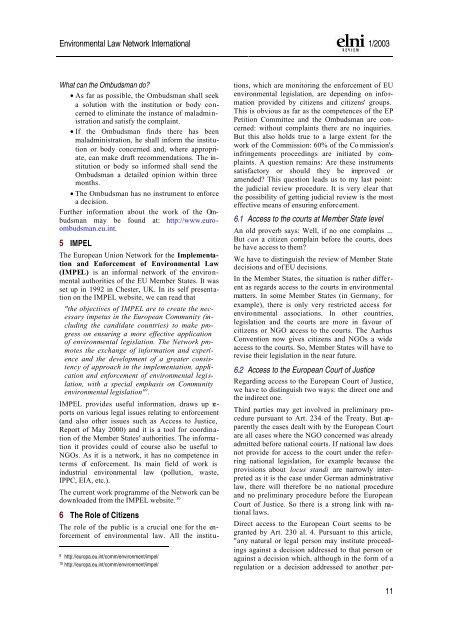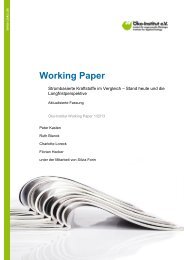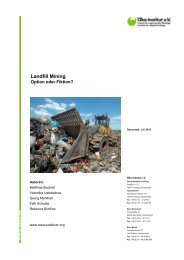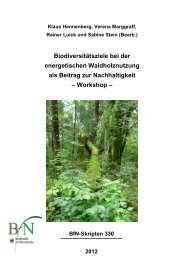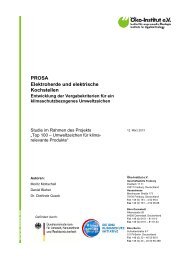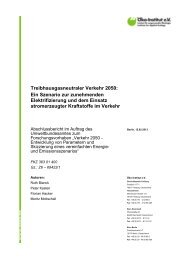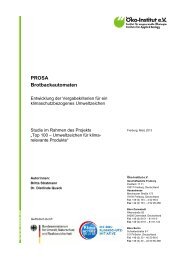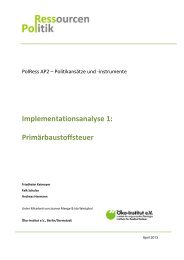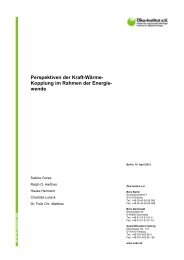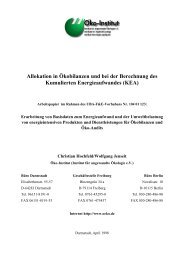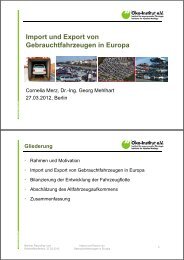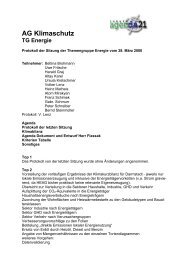elni NEWS - Öko-Institut eV
elni NEWS - Öko-Institut eV
elni NEWS - Öko-Institut eV
Create successful ePaper yourself
Turn your PDF publications into a flip-book with our unique Google optimized e-Paper software.
Environmental Law Network International 1/2003<br />
What can the Ombudsman do?<br />
• As far as possible, the Ombudsman shall seek<br />
a solution with the institution or body concerned<br />
to eliminate the instance of maladministration<br />
and satisfy the complaint.<br />
• If the Ombudsman finds there has been<br />
maladministration, he shall inform the institution<br />
or body concerned and, where appropriate,<br />
can make draft recommendations. The institution<br />
or body so informed shall send the<br />
Ombudsman a detailed opinion within three<br />
months.<br />
• The Ombudsman has no instrument to enforce<br />
a decision.<br />
Further information about the work of the Ombudsman<br />
may be found at: http://www.euroombudsman.eu.int.<br />
5 IMPEL<br />
The European Union Network for the Implementation<br />
and Enforcement of Environmental Law<br />
(IMPEL) is an informal network of the environmental<br />
authorities of the EU Member States. It was<br />
set up in 1992 in Chester, UK. In its self presentation<br />
on the IMPEL website, we can read that<br />
"the objectives of IMPEL are to create the necessary<br />
impetus in the European Community (including<br />
the candidate countries) to make progress<br />
on ensuring a more effective application<br />
of environmental legislation. The Network promotes<br />
the exchange of information and experience<br />
and the development of a greater consistency<br />
of approach in the implementation, application<br />
and enforcement of environmental legislation,<br />
with a special emphasis on Community<br />
environmental legislation" 9 .<br />
IMPEL provides useful information, draws up reports<br />
on various legal issues relating to enforcement<br />
(and also other issues such as Access to Justice,<br />
Report of May 2000) and it is a tool for coordination<br />
of the Member States' authorities. The information<br />
it provides could of course also be useful to<br />
NGOs. As it is a network, it has no competence in<br />
terms of enforcement. Its main field of work is<br />
industrial environmental law (pollution, waste,<br />
IPPC, EIA, etc.).<br />
The current work programme of the Network can be<br />
downloaded from the IMPEL website. 10<br />
6 The Role of Citizens<br />
The role of the public is a crucial one for the enforcement<br />
of environmental law. All the institu-<br />
9 http://europa.eu.int/comm/environment/impel/<br />
10 http://europa.eu.int/comm/environment/impel/<br />
tions, which are monitoring the enforcement of EU<br />
environmental legislation, are depending on information<br />
provided by citizens and citizens' groups.<br />
This is obvious as far as the competences of the EP<br />
Petition Committee and the Ombudsman are concerned:<br />
without complaints there are no inquiries.<br />
But this also holds true to a large extent for the<br />
work of the Commission: 60% of the Co mmission's<br />
infringements proceedings are initiated by complaints.<br />
A question remains: Are these instruments<br />
satisfactory or should they be improved or<br />
amended? This question leads us to my last point:<br />
the judicial review procedure. It is very clear that<br />
the possibility of getting judicial review is the most<br />
effective means of ensuring enforcement.<br />
6.1 Access to the courts at Member State level<br />
An old proverb says: Well, if no one complains ...<br />
But can a citizen complain before the courts, does<br />
he have access to them?<br />
We have to distinguish the review of Member State<br />
decisions and of EU decisions.<br />
In the Member States, the situation is rather different<br />
as regards access to the courts in environmental<br />
matters. In some Member States (in Germany, for<br />
example), there is only very restricted access for<br />
environmental associations. In other countries,<br />
legislation and the courts are more in favour of<br />
citizens or NGO access to the courts. The Aarhus<br />
Convention now gives citizens and NGOs a wide<br />
access to the courts. So, Member States will have to<br />
revise their legislation in the near future.<br />
6.2 Access to the European Court of Justice<br />
Regarding access to the European Court of Justice,<br />
we have to distinguish two ways: the direct one and<br />
the indirect one.<br />
Third parties may get involved in preliminary procedure<br />
pursuant to Art. 234 of the Treaty. But apparently<br />
the cases dealt with by the European Court<br />
are all cases where the NGO concerned was already<br />
admitted before national courts. If national law does<br />
not provide for access to the court under the referring<br />
national legislation, for example because the<br />
provisions about locus standi are narrowly interpreted<br />
as it is the case under German administrative<br />
law, there will therefore be no national procedure<br />
and no preliminary procedure before the European<br />
Court of Justice. So there is a strong link with national<br />
laws.<br />
Direct access to the European Court seems to be<br />
granted by Art. 230 al. 4. Pursuant to this article,<br />
"any natural or legal person may institute proceedings<br />
against a decision addressed to that person or<br />
against a decision which, although in the form of a<br />
regulation or a decision addressed to another per-<br />
11


